Wilson Gogo, Marine Engineer
Wilson Gogo Marine Engineer working as Engine Cadet for Mercy Ships
Wilson Gogo graduated in Marine and Power Plant Engineering from Rivers State University in Port Harcourt, Nigeria. He is now working as an Engine Cadet on Mercy Ships. Wilson is from Nigeria and at present based out of Texas in the USA.
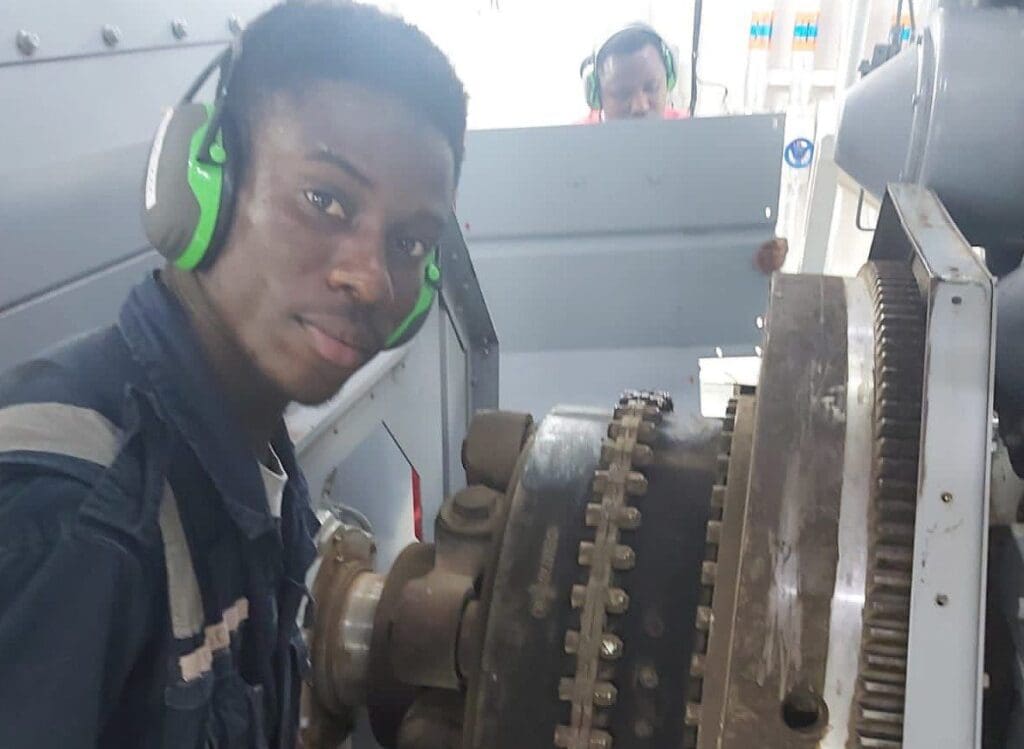

Background and path to marine engineering
Could you give a brief description of your background and what led to your interest in engineering?
I started developing an interest in engineering when I was little because my father had a little 2 stroke generator. So, I would see him do maintenance on it every month while I just watched him helplessly as a kid.
That’s why I wanted to be able to service my dad’s generator. The only way to do that is by studying engineering that is focused on engines and so I chose Marine and Power Plant Engineering.
Were you interested in science and how things work when you were a child?
As a child my parents thought that I was going to be a lawyer because they thought I was very good at proving my point and using facts. However, while in high school I decided to study marine engineering because I wanted to be able to do maintenance on my own engine like my dad and also, I wanted to work on ships.
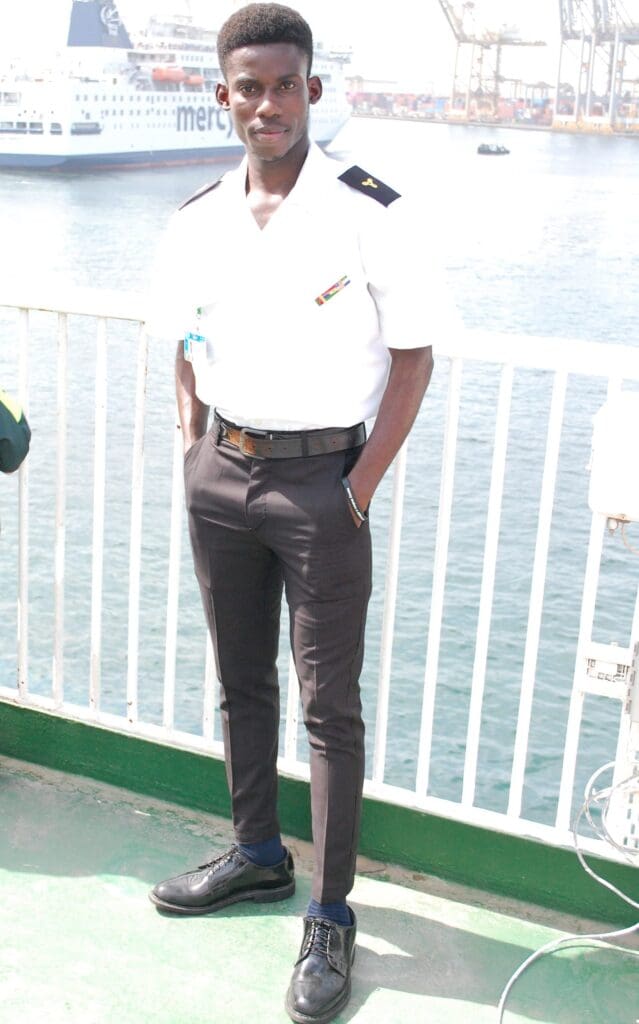

Mentors
Was there anyone in your family who guided you towards engineering?
There was no one in my family that guided me towards engineering, so I had to attend seminars while in university. Also, I made friends with people working on ships as marine engineers and I asked questions.
My best friend was working with an Italian shipping company called Marnavi offshore. Every day I call him to ask him question about his duties on board as a cadet, the types of machinery he was working on and the procedures for carrying out his work.
Has there been a particular person who has inspired you at university or at work, or in the wider world?
I have lots of Engineers who have inspired me.
I worked with a second engineer, Boriss Jegorovs, from Latvia, who always sends me some engineering manuals and files, so I can read and broaden my knowledge.
4th Engineer Edder Soares and 3rd engineer Arkadiusz Zbikowski, taught me lots and would always use their rest periods to teach me about 4 strokes engines.
3rd engineer Akpabio O. Willie and 3rd engineer Lachlan Davit taught me a lot too.
Engineer onboard ship
Can you explain exactly what the engineering team onboard a ship is responsible for?
The engineering team on board a ship is responsible for:
maintenance of the propulsion system (main engines) of the ship,
electricity,
sewage treatment plants,
incinerator plant,
internal fuel oil transfer,
bunkering operation,
maintenance of pumps, compressors, valves etc.
What sort of equipment are you maintaining?
As an Engine Cadet, I work with all the engineers, from Chief Engineer to 4th Engineer.
I assist any engineering officer on duty with maintenance on pumps, compressors, valves, main engines, fuel transfer, sludge transfer, and pumping of bilges.
I am also responsible for cleaning turbocharge air filters, sea trainers, plate coolers, pumping of bilges, painting, and mopping of engine room etc.
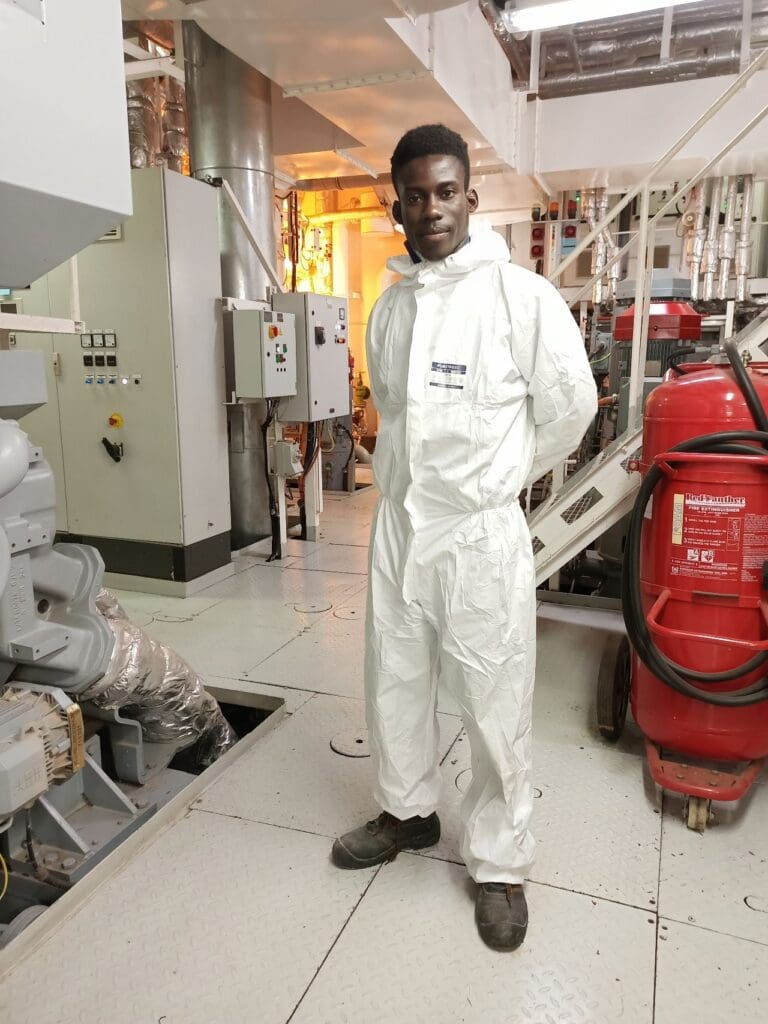

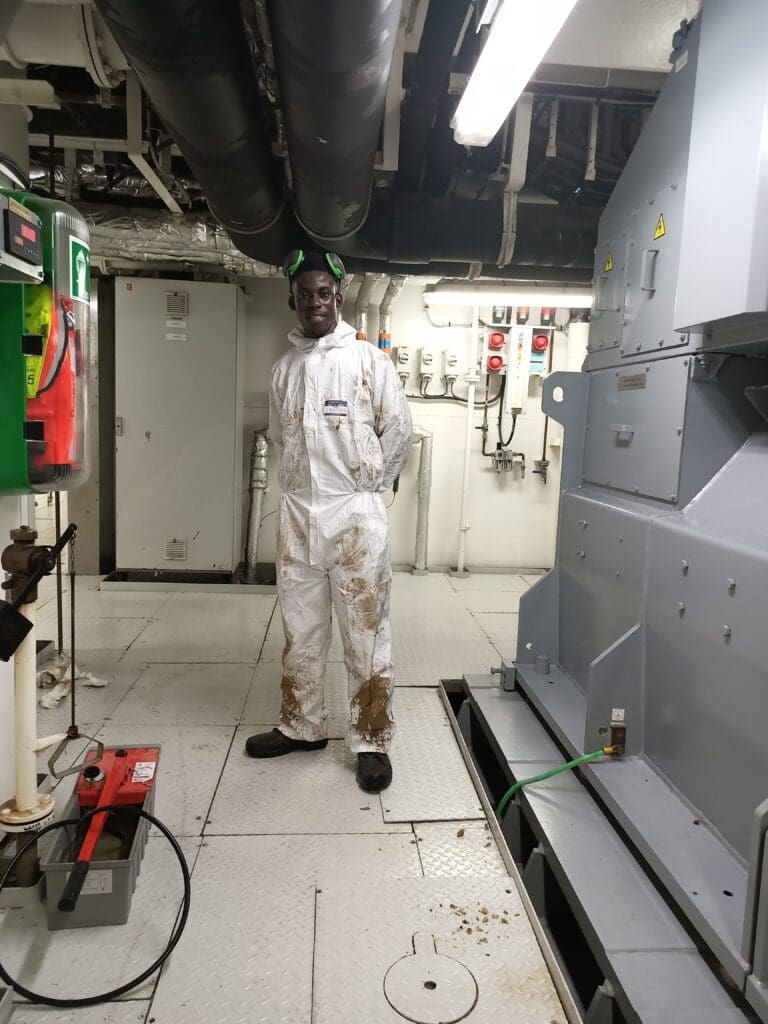

New skills
How do you obtain new skills while you are working?
While working or assisting an engineering officer, I watch closely the procedures he uses while assembling or dismantling a machine.
Which people do you learn from?
I learn from the Chief Engineer to the 4th Engineer to the Motorman on board any vessel I am working with, so literally I learn from everyone.
Typical day
What’s your typical day like?
My typical day depends on which shift I am on.
Firstly, when I take over a watch from the previous watch keeper, I make my duty rounds. This is where I check all machinery including the pressures and temperature on our seawater and freshwater cooling pumps and systems.
Then I check:
our main engine expansion tanks,
bilge well to know if there are any leakages on the pipeline,
our turbocharger air filters condition, and replace it, when necessary,
vibration and abnormal sounds on purifiers/separator,
refrigeration compressors,
diesel service tank level,
chillers,
sewage plants
and also, the incineration system.
I report any abnormalities to the duty engineer and most often carry out any special task assigned to me by my second engineer or duty engineer.
Do you work on a shift basis?
Yes, I do. These are the shifts:
Morning shift from 8am to 4pm.
Afternoon shift from 4pm to 12am.
Evening shift from 12am to 8am.
During my 8-hour shift, I sound all our tanks to know the level and ensure all machinery is in good working condition during my watch before handing over to the next watch keeper. I have to report any concern or things they should take note of during their watch keeping duty.
What do you do when you are not working?
Resting/sleeping after my shift, and then using some time to read and study.
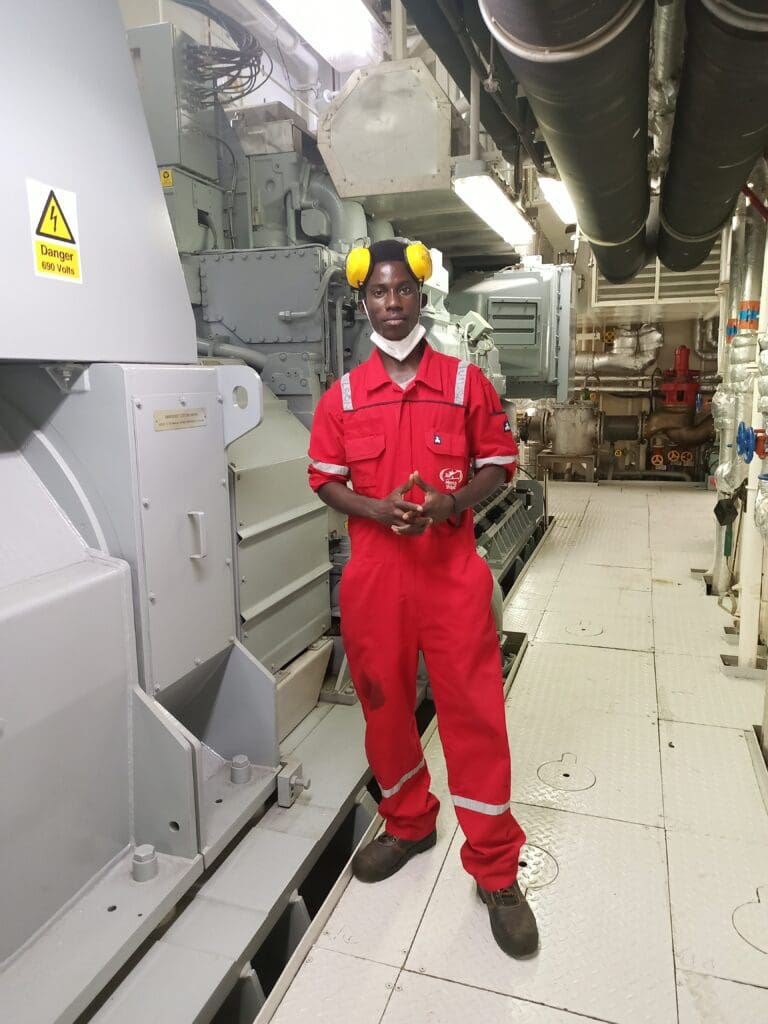

Protective clothing
What sort of protective clothing do you need to wear as an engineer on a ship?
Coveralls, gloves, safety boots, safety goggles, helmet etc.
Most challenging part of the job when at sea
What do you find most challenging when you are working?
Failure of important machinery that will need urgent overhauling like the main engines.
There are systems that if faulty, you need to fix right away. Those can be challenging at times.
What has been your most challenging task so far?
During my first contract, I was just a month onboard, and my supervisor gave me a positive displacement pump to overhaul, it was really challenging because it was my first major maintenance job.
Is your role ever uncomfortable because of heat, cramped spaces, bad lighting etc?
Yes, sometimes you have to work in an enclosed space, like inside of a diesel tank or a void space that has deficiency of oxygen or has poor lighting.
What is more difficult when at sea compared to on land?
Rolling of the vessel during turbulent weather conditions and sailing through areas where there are pirates.
How do you cope with the lack of space and privacy when you are at sea?
I try to adjust to my working environment, knowing I am at an office not in the comfort of my home.
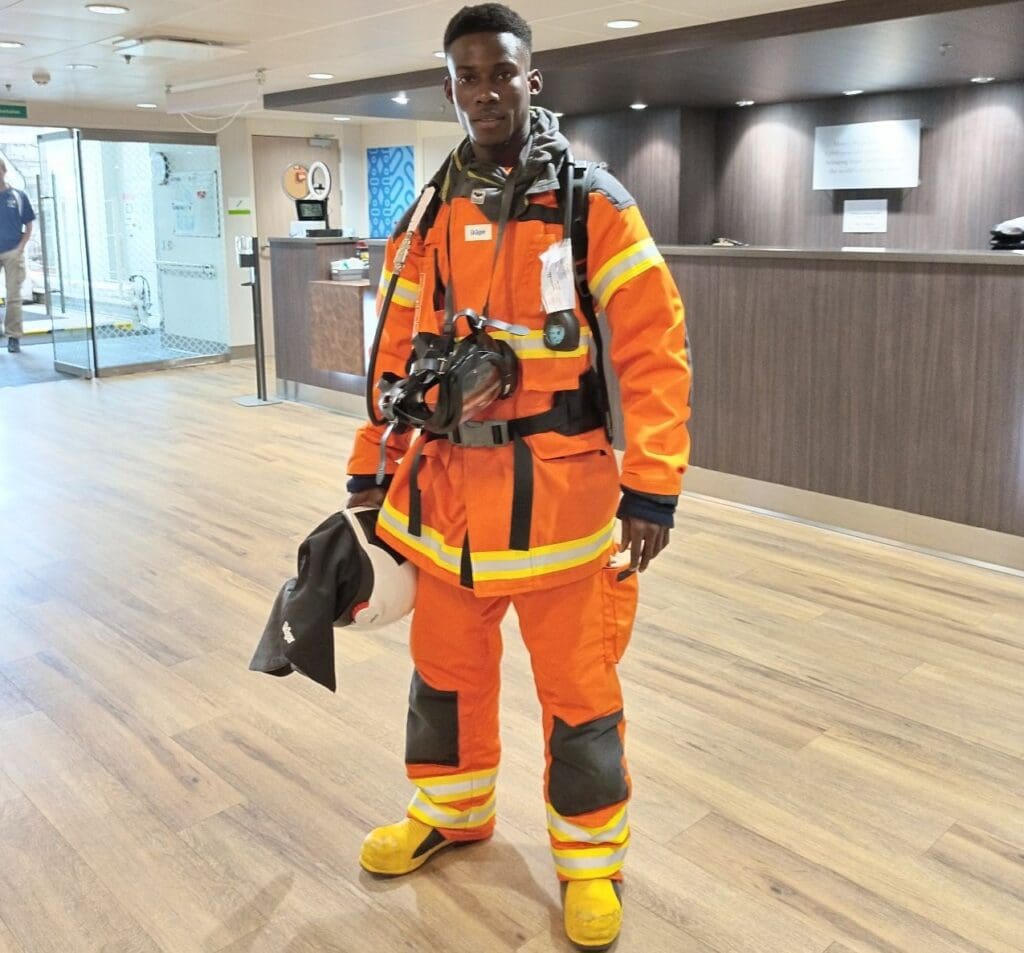

Working internationally
How has working with different nationalities helped you in the work you do?
The best thing that has happened to me is working with an international crew as it has changed my perspective about people’s culture and views/opinions about things.
Advice for new engineers considering working on a ship
What advice would you give to new marine engineers:
In their first week?
Use your first week onboard a ship to study your ship, tracing piping systems, knowing your emergency signals and muster stations.
In their first month?
Read manuals, ask questions, and try to take up simple tasks on your own.
In their first year?
Have a plan for yourself and try to grow with your company.
Apart from a strong technical background, what are the three most important skills to have?
Good computer knowledge
Strong reading and presentation skills
Good team player
How important are language skills?
Onboard a ship, language is often a barrier, so speaking more than one language can be an added advantage.
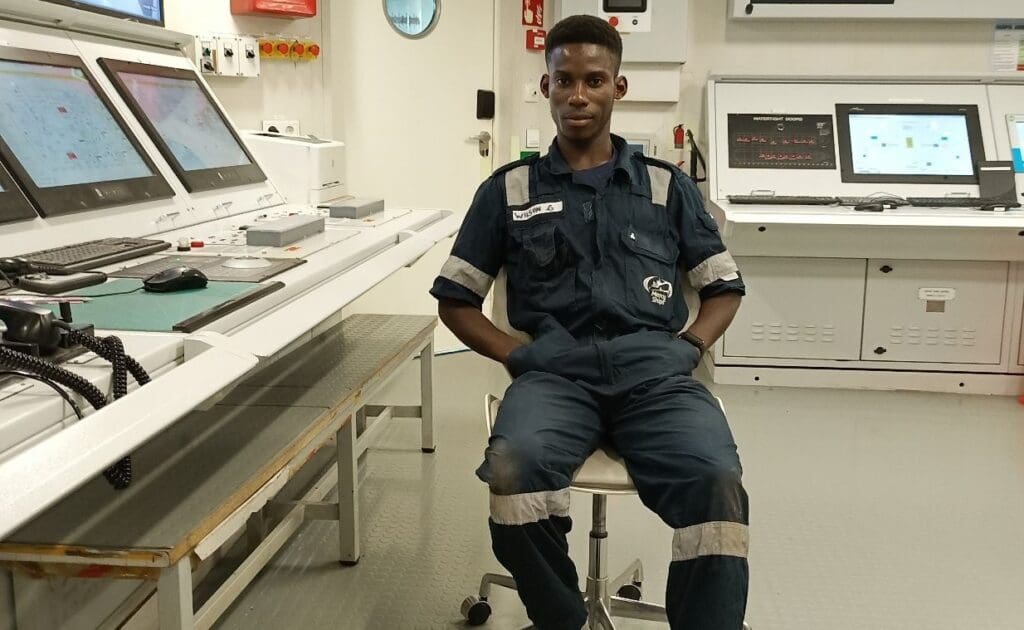



Responses